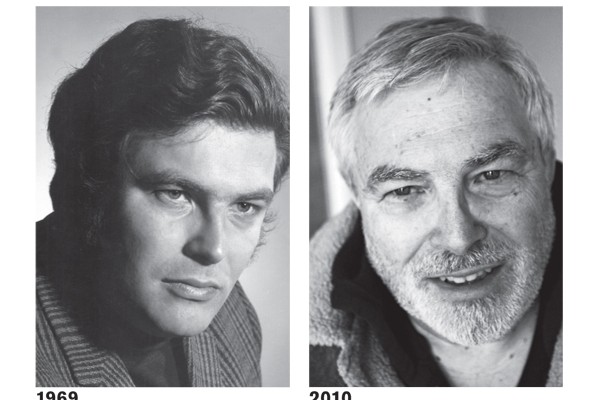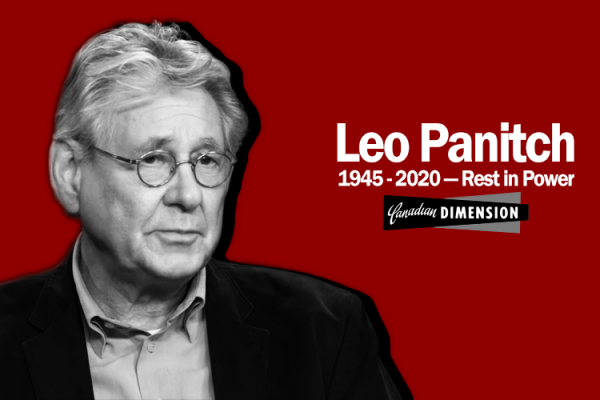J.B. McLachlan revisited
The enduring legacy of a working class hero

The following is an excerpt from the new edition of historian David Frank’s biography of J.B. McLachlan. Originally published in 1999, it was reprinted last year, a century after the strike that sent him to jail for sedition in 1923. J.B. McLachlan: A Biography is a prize-winning classic in Canadian social history, and a rich portrait of a brilliant early 20th-century rebel. It has been widely recognized as an outstanding work of biography and a compelling account of a Canadian labour hero.
“They ravaged the coal mines and robbed the coal miners.” From a century ahead, we can still look back and see James Bryson McLachlan in action, standing up in his staunch way in a crowded hall, always returning to the coal mines to make economic and moral judgements on the failures of capitalism as he knew it. He believed that the coal industry exposed the essential contradictions at the heart of the capitalist system, and that it was the mission of the coal miners to lead the way in building a culture of opposition.
In the time since this biography was first published, McLachlan has continued to stake his claim on the Canadian imagination. He has made his way into reference works and textbooks, he is quoted on Labour Day and other public occasions, and is mentioned in song and poetry. He even appears in a dream sequence in a novel by the Cape Breton writer Sheldon Currie, who had welcomed the original appearance of this book in no uncertain terms. This biography, he wrote, “will elevate J.B. to the heaven of history from whence he can look down on the mess that was made in the coalfields of Nova Scotia.”
From the early industrial revolution in Canada in the 1850s to the mature industrial economy of the 1950s, coal was the dominant source of energy in this country. It was also a way of life for the tens of thousands of Canadians who lived and worked in communities that supported the coal industry. The boom and bust of resource exploitation is a familiar theme in Canadian economic history, and in the case of non-renewable resources, the logic of extractive capitalism is unforgiving.
Moreover, the time is arriving, too slowly in many parts of the world, when the burning of fossil fuels will be replaced by more sustainable sources of energy. As environmental historian Barbara Freese has put it, the world’s coal deposits are vestiges of extinct forms of plant life, and the coal industry itself now belongs to “the industrial childhood of civilization.” Something similar might also be said about the outdated legacies of inequality and oppression associated with the mining of coal.
Throughout its long years of ascendancy, the coal industry demanded an enormous human price from the people and communities who served its needs and laboured to make a living within this environment. At the same time, the people of the coal country did not submit unconditionally to the circumstances they confronted. Instead, they fought to maintain their dignity in the face of exploitation and to achieve social and economic changes worthy of an advancing civilization.
The modern labour movement is one of their legacies. While the Winnipeg General Strike of 1919 is the best known episode in the wave of strikes that took place across Canada at the end of the Great War, there are strong reasons to remember the events in Nova Scotia during this same period as equally dramatic, consequential and instructive.
Ironically, in that year of widespread unrest in 1919, the Nova Scotia coal miners had no need to strike for union recognition, as their union was already marching from victory to victory, winning shorter hours and better pay. What followed, in the turmoil of an employers’ offensive across North America in the 1920s, was a long battle to defend those gains and maintain their union. They succeeded to a larger extent than most coal miners on the continent, and in Canada their struggle helped prepare the way for an end to the use of military force in labour disputes and more widespread acceptance of collective bargaining.
One formal acknowledgement entered the public record in 2017, when the Historic Sites and Monuments Board of Canada unveiled a plaque at the Cape Breton Miners’ Museum in Glace Bay, recognizing the Nova Scotia coal strikes of the 1920s as events of national historical significance. The tribute to the coal miners reads, in part: “Despite desperate living conditions and pressure from company police and the military, they drew on shared workplace and community ties to ‘stand the gaff.’ The success of the miners’ union in defending collective bargaining rights marked the beginning of a new era in Canadian labour relations policies.”
The biography of James Bryson McLachlan is unique in its own way, more archetypal than typical. His story allows us to explore the ways in which industrial capitalism shaped the lives of workers in the coal country and led them to strive for a better future. McLachlan was instrumental in this process, not least because he was a coal miner himself from an early age, and his followers knew that he understood their world, their work, their lives, and their hopes.

Individuals do make a difference in history, especially when they are associated with social movements that carry their ideas forward into the future. But their legacies are often contested, and some would dismiss McLachlan as a nuisance and a troublemaker. That accusation might well put him in the company of earlier Canadian heroes such as William Lyon Mackenzie and Louis Riel, who, despite their historical significance, have suffered their own patronizing disparagement in the judgements of history.
More generally, McLachlan’s story belongs to the era of modernist industrial capitalism and the rise of organized labour as a force for social change. Just as rebels in earlier centuries battled for political democracy in an age of absolutism, 20th-century radicals and revolutionaries such as McLachlan fought for more responsible forms of economic governance.
In his own lifetime, McLachlan’s expulsion from union office and his trial for seditious libel in 1923 was only the most notorious effort to curb his influence and discredit his ideas. In retrospect what may be most impressive about McLachlan is the stoic determination that he demonstrated in the face of changing historical odds.
From his earliest days as a 10-year-old boy in the coal mines in Scotland through to his later years as a veteran of labour radicalism in Canada, McLachlan lived within a set of economic, political, social and cultural conditions that both welcomed his aspirations and also confounded them. He believed that it was the mission of the working class to “redeem the world from the chaos of capitalism,” but he did not pretend to know exactly how history would unfold—only that it must. Revolutions, McLachlan told a royal commission in 1925, are like the North Wind: “They come somehow, of their own accord, and I don’t know how they come, but they come, that’s all, they come out of conditions.”
In teaching labour history over the years, both to university classes and to union members, I have sometimes asked students to consider what McLachlan would think of the modern system of labour relations that was already in the making during his lifetime. Was the achievement of “industrial legality,” with its apparatus of responsibilities and restrictions, a decisive victory for workers?
The answers are not easy ones. McLachlan always worried about excessive reliance on the collective agreement and an accompanying reduction of union militancy. He would be concerned too about the new methods governments and employers have found to enforce coercion and undermine an independent working-class outlook.
McLachlan in Toronto, 1928, with union organizer Max Shur and Jimmie Buller (son of Annie Buller).
Unions were not going to disappear, but new forms of agitation, education and organization would be necessary to extend their effectiveness in the face of changing technologies and new ways of structuring work processes. Above all, McLachlan knew that it was up to the members, and the leaders who supported them, to ensure that unions lived up to their purposes as sites of resistance in the struggle for social justice and economic democracy.
And what happened to the social revolution that McLachlan had hoped to see? It did not arrive, at least not in the form that McLachlan had expected. His searing indictments of the capitalist system were accompanied by a hopeful vision of a future society free of class exploitation. But as a practical revolutionary, he knew that he functioned in a society where revolutions were difficult to make and not predictable in their shape or their outcomes.
Even as capitalism remained the dominant economic system, there was some hardwon progress. From McLachlan’s perspective, the advance of the self-styled welfare state might be seen as a “passive revolution” in which selective concessions to popular demands serve to legitimize and consolidate the dominant economic order. Every gain was worthwhile, but by the end of the 20th-century a strategy of gradual encroachment on capitalist priorities was losing its effectiveness. Governments were retreating from social responsibilities in favour of the myth that social outcomes are best determined by market forces, conveniently overlooking the close partnership of business and the state that serves to maintain inequalities.
As a result, unions have been called upon to seek out allies and return to action to defend and extend their achievements. McLachlan would have to come to grips with the welcome multiplication of oppositional movements in the contemporary world and the difficult legacies of patriarchy and racialization within the working class. But he would remain certain that struggles over the distribution of wealth and power, both economic and political, remain a permanent feature of the capitalist system.
There were always limits to what the coal miners could achieve on their own, and by the 1950s they no longer had the power they once had. The shutdown of the coal industry in Nova Scotia was only a matter of time.
As the search for alternative strategies of economic development continues, the people of the coal country resent the journalistic cliché of deserted towns and traumatized residents only waiting to go back into an industry on which the sun has set. In attending to their past, what they want is recognition of the human and environmental costs they have paid, and support for a more sustainable future.
There are messages here for all of us as we face repeated claims that there are no alternatives to the allegedly creative destruction of capitalism and the fatal degeneration of social solidarities. Across Canada and in other parts of the world, we find children of the coal country who have moved on. Like McLachlan, they warn us not to forget what we have learned from the age of coal about resource exploitation and industrial capitalism.
History does not allow for a great deal in the way of direct instructions, but it is capable of identifying the times and places where people disturbed the complacencies of their time. In doing so, they brought about changes that were necessary but never inevitable. These struggles did not fully succeed, far from it, but their influence continues to be felt long past their time, and this too is one of McLachlan’s legacies.
David Frank is Professor Emeritus at the University of New Brunswick. His articles on labour and social history have appeared in numerous books and journals.










